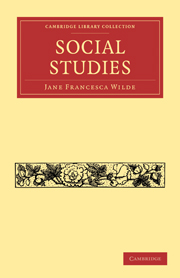Book contents
- Frontmatter
- Contents
- WORKS BY LADY WILDE
- THE BONDAGE OF WOMAN
- GENIUS AND MARRIAGE
- SOCIAL GRACES
- VENUS VICTRIX
- SPIRITUAL AFFINITY
- SUITABILITY OF DRESS
- AMERICAN WOMEN
- THE WORLD'S NEW PHASES
- THE DESTINY OF HUMANITY
- AUSTRALIA (a Plea for Emigration)
- THE VISION OF THE VATICAN
- IRISH LEADERS AND MARTYRS
- THE POET AS TEACHER
- THE TWO ARTISTS: A SKETCH (from the Spanish)
- ‘TERTIA MORS EST’ (from the German,)
GENIUS AND MARRIAGE
Published online by Cambridge University Press: 05 March 2012
- Frontmatter
- Contents
- WORKS BY LADY WILDE
- THE BONDAGE OF WOMAN
- GENIUS AND MARRIAGE
- SOCIAL GRACES
- VENUS VICTRIX
- SPIRITUAL AFFINITY
- SUITABILITY OF DRESS
- AMERICAN WOMEN
- THE WORLD'S NEW PHASES
- THE DESTINY OF HUMANITY
- AUSTRALIA (a Plea for Emigration)
- THE VISION OF THE VATICAN
- IRISH LEADERS AND MARTYRS
- THE POET AS TEACHER
- THE TWO ARTISTS: A SKETCH (from the Spanish)
- ‘TERTIA MORS EST’ (from the German,)
Summary
Alphonse Daudet, the brilliant French novelist, maintains in his clever work, ‘Les Femmes d'Artistes’ that the marriage state is quite detrimental to the highest intellectual life, and mars its development. Not that he speaks from the experience of his own home, for his wife is a brilliant, handsome woman, holds her station with distinguished success, and is quite worthy to be the wife of a celebrity; while Daudet himself has none of that severe dogmatism which makes nervous people tremble in the presence of intellect; he is handsome and fascinating, with beautiful eyes and perfect manners. But such marriages, where life glides on in graceful calm without a discord or the crash of opposing temper, are rare and exceptional. The rule remains that complete isolation from small domestic cares, perfect freedom from all social routine, is absolutaly necessary for those peculiar natures in which the tumultuous elements of genius are always striving toward some visible organic expression.
‘No solitude, no glory’ should be the epigraph over the sacred adytum where the priesthood of intellect celebrate their mysteries. And, with this passion for solitude strong in him, Daudet, when first entering on the literary career, fled from the glare of Paris pleasures and took up his abode for months in the weird solitude of a lighthouse, on an island rock off the coast of Corsica, holding communion only with the winds and the waves and the rushing tempest of his own emotions.
- Type
- Chapter
- Information
- Social Studies , pp. 28 - 52Publisher: Cambridge University PressPrint publication year: 2010First published in: 1893

